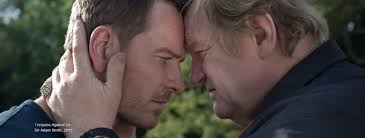
Moonlight, dir. Barry Jenkins – This urban tale of a boy growing up disadvantaged on so many levels, is counter intuitive and that’s why it works. The music is anything but urban, it is classical, new age and choral. The film’s lyricism imbues the inner city with the beauty of a rural landscape, contrasting powerfully with the gritty street level realism of life in the Atlanta projects. Its bravura and cinematic mastery is bold. And it’s one of the best films at TIFF. We follow a boy through three stages of his life, as the youngster whose mother is a heroin addict, through an episode in his teen years in which he discovers sexuality is fluid and life has opportunity. The biggest surprise is meeting him as an adult. We aren’t sure if he will fulfill the promise and dreams of his youthful imagination and academic ability. The character uses a new name for each stage of his young life, sheds the previous life and moves along. The cinematography is gorgeous; the light recalls Terrence Malick’s rural hymns and his poetic view of the world. Moonlight’s strong cast especially the actors playing our lead character give the film its muscle, with special mention for Bond’s Moneypenny Naomie Harris as the addict mother, and singer / Cover Girl model Janelle Monáe as his protector’s girlfriend. It’s a joy.
Snowden, dir. Oliver Stone
Joseph Gordon-Levitt is restrained as Edward Snowden in a feature based on the whistleblower’s background, work, idealism and reasons for leaking secret surveillance data to the world. He was a high school graduate who taught himself computer coding and worked with sensitive materials for the CIA and the National Security Agency before leaking details of how the US government was spying not just on persons of interest but on everyone, globally, via their electronic paths. We know the story but of course we don’t. Many juicy tidbits are revealed. Snowden’s pulse pounding escape from Tokyo never ceases to amaze, and we wonder anew why he did it and where he will sit in history’s pages. However, the film loses some of its steam in its excessive length, stretching itself beyond its need. Stone’s film is far less strident and grandiose than his previous political films, and Gordon-Levitt’s tone of gravitas without hysteria fits well.
Michael Fassbender is second in command of a band of gypsies in the edgy domestic drama Trespass Against Us (dir. Adam Smith). Brendan Gleeson plays his all-powerful father and criminal boss who holds full control over the family and its caravans, its animals, activities and values. He believes the world is flat or at least says it is. He wants things to be simple and denies modern life. Fassbender’s Chad has a wife and youngsters and while he would like them to be educated and lead better lives than they do, it is impossible under his father’s toxic rule. So Chad inevitably continues the closed-minded family tradition of refusing education for the youngsters, thereby depriving them the opportunity of bettering themselves. All are kept in line and in isolation in their field squat as he bangs into them the ironic idea that authority of any kind is evil. Chad hasn’t the courage to defy him even as his wife (Lyndsey Marshall) begs him for a fresh start anywhere else. Strangely, Chad has chosen to be stuck in horse manure for lacking courage and he still elicits our sympathy. Marshall’s poignant performance comes from her waging a fruitless battle to leave. It’s a fascinating look at the world of these travelers and an eloquent statement on family politics.

It’s Only the End of the World / Juste la fin du monde (original title) (dir. Xavier Dolan) This is the hotly anticipated new film from Xavier Dolan. It won two prizes at Cannes and features some of France’s top actors (Lea Seydoux, Vincent Cassel, Marion Cotillard and Gaspard Ulliel). Dolan chose to shoot it in France and unusual move for a proud Quebecker. A young man comes home after a twelve year absence to break sad news and to repair relations, but he can’t get past the family’s deep dysfunction. He looks for them to be calm, collected, together, open and loving and never finds it. This is a heart breaking and realistic comment on selfishness and poor choices, and boy it gets under the skin. It’s not Dolan’s best work but it’s still better than most.
Happiest Day in the Life of Olli Maki (dir. Juho Kuosmanen) is Finland’s Oscar foreign language submission, fresh off its win at Cannes this year in the category of Un Certain Regard. It is crystalline black and white, shot on 16 MM film which helps set it in its time frame of 1962. It’s the true story of a Finnish boxer preparing to fight American Davey Moore for the Featherweight World Championship on home turf in Finland. His passionate hatred of the publicity storm cooked up by his thoughtless manager eats away at him. And he can’t stop thinking about his new girlfriend, someone who does think about him and what will make him happy. There is a lot riding on the fight, including national pride, Finland’s place the on world stage, and of course, making money for everyone. Each moment is beautifully observed and layered. It’s infused with sly humour, wonderful detail and beauty. I can hardly believe it but this is the first feature for Kuosmanen and its worth its weight in gold.
American Honey (dir. Andrea Arnold) Elvis Presley’s granddaughter Riley Keough plays the leader of a band of magazine sales gypsies, i.e. homeless, aimless teens looking for quick bucks, traveling as nomads together, acting out and acting up. Shia Le Beouf is her right hand man, instructor of new “hires” on how to fast talk a housewife into buying the product with whatever lies will work in any situation. The troupe spends most of its time in the van drugging and drinking and telling their sad stories. These kids aren’t pampered, they grew up rough, alone, unloved and and have no idea how to “fit in” to society and no desire to. They’re waiting on the next dollar and next escape via sex and other painkillers. It’s hard to take but it certainly gets your attention and at almost three hours, it is demanding. You’re put in the van with them, and it may not be the place you want to be.
Free Fire (dir. Ben Wheatley). This is a bit of fashionable B.S., yet another installment of the total eradication-by-gun genre that must include The Hateful Eight, Reservoir Dogs and their ilk. The excuse for a never ending, violent, loud and messy mass shootout in a ruined factory, is a drug deal gone awry. Dealers and buyers warily approach each other but one low ranking gangster recognizes the man on the other team as the one who beat him up the previous night. He pounces across the invisible line in the sand and attacks him, launching a free-for-all, and surely the longest, loudest, and uninterruptedly violent gunfight in recent film memory. Per Wheatley, it’s brutal but imaginative, gory, smart-ass stupid, and ultimately, due to the monotony of the constant hail of bullets, and no new outcomes, dull. No character is sympathetic because the filmmaker has put people in a video game so it’s hard to be invested in who remains standing. And a real headscratcher – Armie Hammer and Oscar winner Brie Larson are in this thing. Its motto “Life is Really Cheap. Have At It”. Some people think it’s a blast. And funny.
Boundaries / Pays (dir. Chloé Robichaud) Emily Van Camp (Revenge) is a professional mediator who is steering a heated set of discussions between the Canadian government and that of a small independent island country off the coast of Newfoundland. I can’t find it but wonder if the French territory of San Pierre and Miquelon was the model. The meetings take place in a school gym; some members are angry before they get there and act like teens with attitude problems. The question on the table is how to enter into an agreement between Canada, the island country and an iron mine to fairly exploit the local iron resources and reward the community. The environment, jobs, the island people’s welfare and the issue of trust between business entities and government are all factors. The stink of corruption is bad. Meanwhile Van Camp’s character’s husband is suing for sole custody of their son because of her absences for work. And then an islander goes berserk. This film is as minimalist as it gets and that’s its greatest strength. Focus is forced on the issues which are byzantine, and the emotional baggage that comes with them. It’s a dinosaur in a way, the settings are dated, it’s isolated in time and space and the talk goes around in circles. Should these unique outliers be modernised? Brilliant.
